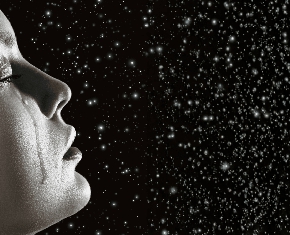The views expressed in our content reflect individual perspectives and do not represent the authoritative views of the Baha'i Faith.
Here’s one of life’s biggest questions: do you believe anything lasts forever?
Give it some thought for a minute. After all, pretty much everything in this material world around us has an expiration date.
If you have pets when you’re young, you learn that hard lesson early. I still think that’s one of the great tragedies of life: dog years. When I was a boy, and my first dog died, I was inconsolable. It was very, very hard for me to accept the fact that Missy the boxer was gone. I cried. My parents tried to explain that a dog ages seven years for every human year, so they don’t live as long as we do. I found that fact terribly cruel, because I missed my dog so deeply. I wanted to know: Why couldn’t everything live forever?
Which made me wonder—what does live forever? Animals don’t. People certainly don’t. Trees don’t. Even planets and stars don’t. Everything physical composes and eventually decomposes. But what if, I asked my younger self, we could find something that never died, something imperishable?
I believe that most of us experience that inner yearning. Because this world is so temporary, so transient, we have a deep desire to discover the eternal. The Baha’i teachings answer that quest by assuring us that an eternal, imperishable dominion does exist:
O Son of Being! If thine heart be set upon this eternal, imperishable dominion, and this ancient, everlasting life, forsake this mortal and fleeting sovereignty. – Baha’u’llah, The Hidden Words, p. 16.
When my wife and I and our friends Don and Peggy got together for a Valentine’s Day dinner, we talked about the difference between Unitarians and Baha’is. Don suggested the biggest difference between the two was the abiding faith in God, which the Baha’i teachings affirm. That struck us as a fascinating insight, and we all went home contemplating it.
Later, I wanted to know more about what the Baha’i writings have to say on the subject. I found this quote from Baha’u’llah, the prophet and founder of the Baha’i Faith:
To every discerning and illuminated heart it is evident that God, the unknowable Essence, the Divine Being, is immensely exalted beyond every human attribute, such as corporeal existence, ascent and descent, egress and regress. Far be it from His glory that human tongue should adequately recount His praise, or that human heart comprehend His fathomless mystery. He is, and hath ever been, veiled in the ancient eternity of His Essence, and will remain in His Reality everlastingly hidden from the sight of men. – Baha’u’llah, Gleanings from the Writings of Baha’u’llah, p. 46.
For Baha’is, God is “immensely exalted above every human attribute,” a boundless, timeless, unknowable essence that we humans can never access or comprehend. The Baha’i teachings describe the Supreme Being as “ancient, imperishable and everlasting,” and an “invisible Reality,” never even remotely understandable by His creation. This bedrock belief—that an everlasting Creator exists—forms the foundation of all Baha’i teachings.
How do Baha’is know God exists? The Baha’i teachings contain many different proofs of the existence of a Supreme Being, but for Baha’is, the main path to the knowledge of God comes directly from His prophets and messengers—Abraham, Krishna, Moses, Buddha, Christ, Muhammad and now Baha’u’llah—those “luminous Gems of Holiness” who impart the mysteries of God to His creation:
The door of the knowledge of the Ancient of Days being thus closed in the face of all beings, the Source of infinite grace, according to His saying, “His grace hath transcended all things; My grace hath encompassed them all,” hath caused those luminous Gems of Holiness to appear out of the realm of the spirit, in the noble form of the human temple, and be made manifest unto all men, that they may impart unto the world the mysteries of the unchangeable Being, and tell of the subtleties of His imperishable Essence.
These sanctified Mirrors, these Day Springs of ancient glory, are, one and all, the Exponents on earth of Him Who is the central Orb of the universe, its Essence and ultimate Purpose. – Ibid., pp. 46-47.
















Comments
Sign in or create an account
Continue with Googleor